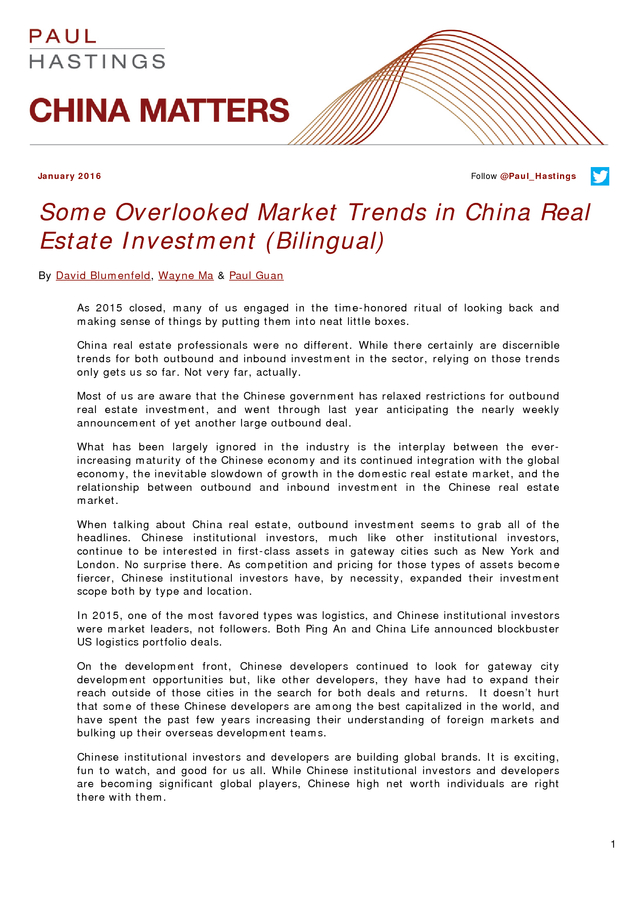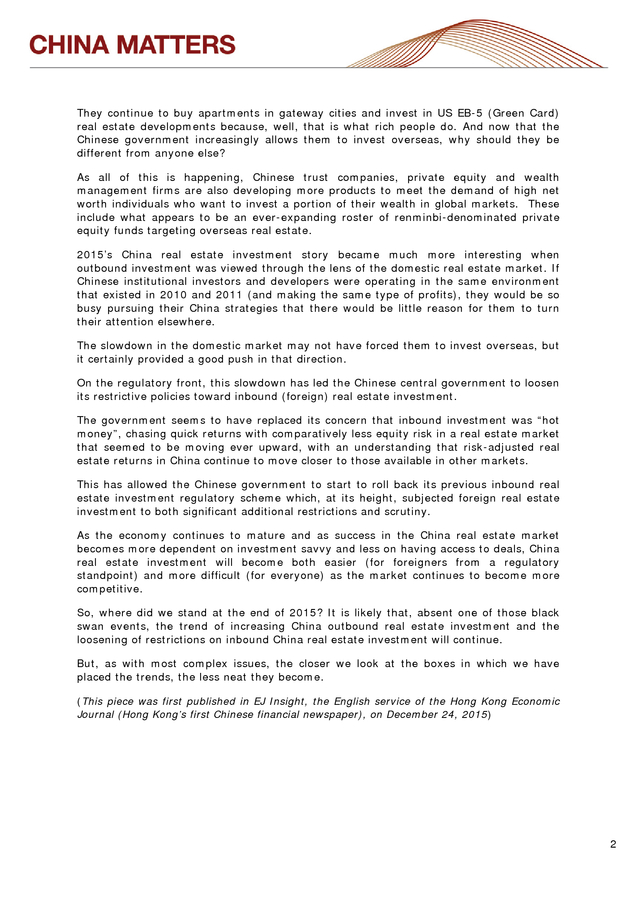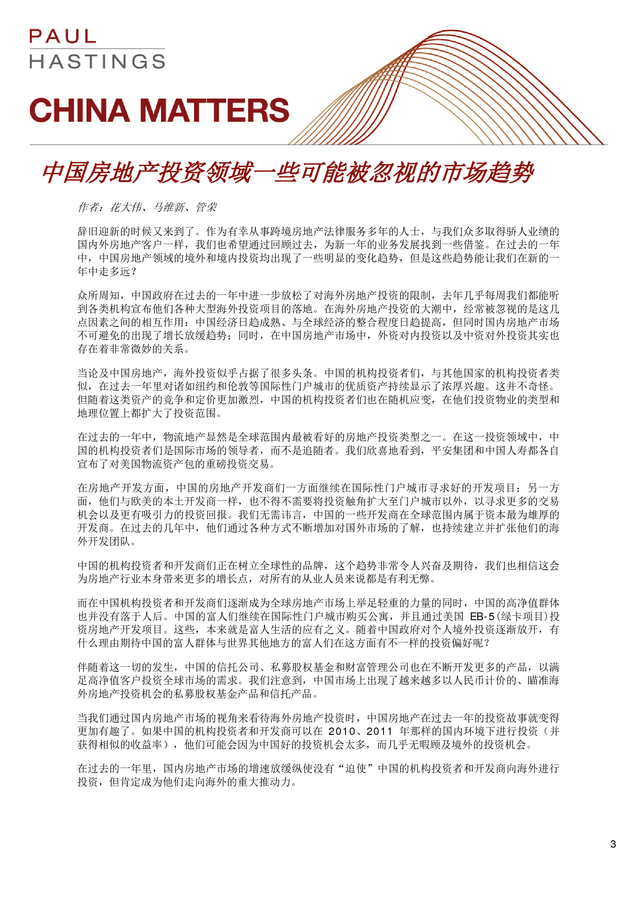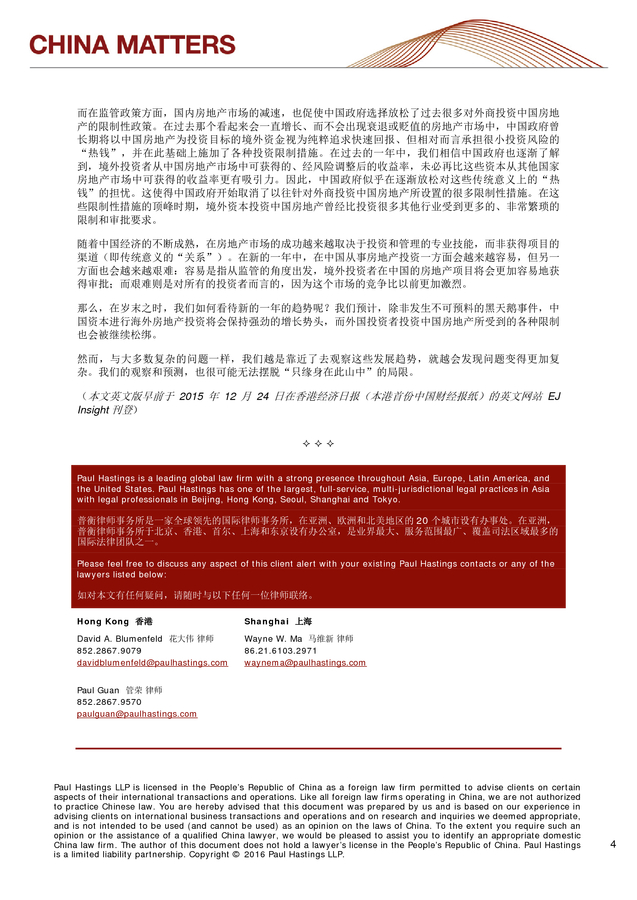Description
January 2016
Follow @Paul_Hastings
Some Overlooked Market Trends in China Real
Estate Investment (Bilingual)
By David Blumenfeld, Wayne Ma & Paul Guan
As 2015 closed, many of us engaged in the time-honored ritual of looking back and
making sense of things by putting them into neat little boxes.
China real estate professionals were no different. While there certainly are discernible
trends for both outbound and inbound investment in the sector, relying on those trends
only gets us so far. Not very far, actually.
Most of us are aware that the Chinese government has relaxed restrictions for outbound
real estate investment, and went through last year anticipating the nearly weekly
announcement of yet another large outbound deal.
What has been largely ignored in the industry is the interplay between the everincreasing maturity of the Chinese economy and its continued integration with the global
economy, the inevitable slowdown of growth in the domestic real estate market, and the
relationship between outbound and inbound investment in the Chinese real estate
market.
When talking about China real estate, outbound investment seems to grab all of the
headlines. Chinese institutional investors, much like other institutional investors,
continue to be interested in first-class assets in gateway cities such as New York and
London.
No surprise there. As competition and pricing for those types of assets become fiercer, Chinese institutional investors have, by necessity, expanded their investment scope both by type and location. In 2015, one of the most favored types was logistics, and Chinese institutional investors were market leaders, not followers. Both Ping An and China Life announced blockbuster US logistics portfolio deals. On the development front, Chinese developers continued to look for gateway city development opportunities but, like other developers, they have had to expand their reach outside of those cities in the search for both deals and returns.
It doesn’t hurt that some of these Chinese developers are among the best capitalized in the world, and have spent the past few years increasing their understanding of foreign markets and bulking up their overseas development teams. Chinese institutional investors and developers are building global brands. It is exciting, fun to watch, and good for us all. While Chinese institutional investors and developers are becoming significant global players, Chinese high net worth individuals are right there with them. 1 .
They continue to buy apartments in gateway cities and invest in US EB-5 (Green Card) real estate developments because, well, that is what rich people do. And now that the Chinese government increasingly allows them to invest overseas, why should they be different from anyone else? As all of this is happening, Chinese trust companies, private equity and wealth management firms are also developing more products to meet the demand of high net worth individuals who want to invest a portion of their wealth in global markets. These include what appears to be an ever-expanding roster of renminbi-denominated private equity funds targeting overseas real estate. 2015’s China real estate investment story became much more interesting when outbound investment was viewed through the lens of the domestic real estate market. If Chinese institutional investors and developers were operating in the same environment that existed in 2010 and 2011 (and making the same type of profits), they would be so busy pursuing their China strategies that there would be little reason for them to turn their attention elsewhere. The slowdown in the domestic market may not have forced them to invest overseas, but it certainly provided a good push in that direction. On the regulatory front, this slowdown has led the Chinese central government to loosen its restrictive policies toward inbound (foreign) real estate investment. The government seems to have replaced its concern that inbound investment was “hot money”, chasing quick returns with comparatively less equity risk in a real estate market that seemed to be moving ever upward, with an understanding that risk-adjusted real estate returns in China continue to move closer to those available in other markets. This has allowed the Chinese government to start to roll back its previous inbound real estate investment regulatory scheme which, at its height, subjected foreign real estate investment to both significant additional restrictions and scrutiny. As the economy continues to mature and as success in the China real estate market becomes more dependent on investment savvy and less on having access to deals, China real estate investment will become both easier (for foreigners from a regulatory standpoint) and more difficult (for everyone) as the market continues to become more competitive. So, where did we stand at the end of 2015? It is likely that, absent one of those black swan events, the trend of increasing China outbound real estate investment and the loosening of restrictions on inbound China real estate investment will continue. But, as with most complex issues, the closer we look at the boxes in which we have placed the trends, the less neat they become. (This piece was first published in EJ Insight, the English service of the Hong Kong Economic Journal (Hong Kong’s first Chinese financial newspaper), on December 24, 2015) 2 .
ä¸å›½æˆ¿åœ°äº§æŠ•èµ„领域一些å¯èƒ½è¢«å¿½è§†çš„市场趋势 作者:花大伟ã€é©¬ç»´æ–°ã€ç®¡è£ 辞旧迎新的时候åˆæ¥åˆ°äº†ã€‚作为有幸从事跨境房地产法律æœåŠ¡å¤šå¹´çš„人士,与我们众多å–得骄人业绩的 å›½å†…å¤–æˆ¿åœ°äº§å®¢æˆ·ä¸€æ ·ï¼Œæˆ‘ä»¬ä¹Ÿå¸Œæœ›é€šè¿‡å›žé¡¾è¿‡åŽ»ï¼Œä¸ºæ–°ä¸€å¹´çš„ä¸šåŠ¡å‘展找到一些借鉴。在过去的一年 ä¸ï¼Œä¸å›½æˆ¿åœ°äº§é¢†åŸŸçš„境外和境内投资å‡å‡ºçŽ°äº†ä¸€äº›æ˜Žæ˜¾çš„å˜åŒ–趋势,但是这些趋势能让我们在新的一 å¹´ä¸èµ°å¤šè¿œï¼Ÿ 众所周知,ä¸å›½æ”¿åºœåœ¨è¿‡åŽ»çš„一年ä¸è¿›ä¸€æ¥æ”¾æ¾äº†å¯¹æµ·å¤–房地产投资的é™åˆ¶ï¼ŒåŽ»å¹´å‡ 乎æ¯å‘¨æˆ‘ä»¬éƒ½èƒ½å¬ åˆ°å„类机构宣布他们å„ç§å¤§åž‹æµ·å¤–投资项目的è½åœ°ã€‚在海外房地产投资的大潮ä¸ï¼Œç»å¸¸è¢«å¿½è§†çš„æ˜¯è¿™å‡ ç‚¹å› ç´ ä¹‹é—´çš„ç›¸äº’ä½œç”¨ï¼šä¸å›½ç»æµŽæ—¥è¶‹æˆç†Ÿã€ä¸Žå…¨çƒç»æµŽçš„æ•´åˆç¨‹åº¦æ—¥è¶‹æ高,但åŒæ—¶å›½å†…房地产市场 ä¸å¯é¿å…的出现了增长放缓趋势;åŒæ—¶ï¼Œåœ¨ä¸å›½æˆ¿åœ°äº§å¸‚场ä¸ï¼Œå¤–资对内投资以åŠä¸èµ„对外投资其实也 å˜åœ¨ç€éžå¸¸å¾®å¦™çš„关系。 当论åŠä¸å›½æˆ¿åœ°äº§ï¼Œæµ·å¤–投资似乎å æ®äº†å¾ˆå¤šå¤´æ¡ã€‚ä¸å›½çš„机构投资者们,与其他国家的机构投资者类 似,在过去一年里对诸如纽约和伦敦ç‰å›½é™…性门户城市的优质资产æŒç»æ˜¾ç¤ºäº†æµ“厚兴趣。这并ä¸å¥‡æ€ªã€‚ 但éšç€è¿™ç±»èµ„äº§çš„ç«žäº‰å’Œå®šä»·æ›´åŠ æ¿€çƒˆï¼Œä¸å›½çš„机构投资者们也在éšæœºåº”å˜ï¼Œåœ¨ä»–们投资物业的类型和 地ç†ä½ç½®ä¸Šéƒ½æ‰©å¤§äº†æŠ•èµ„范围。 在过去的一年ä¸ï¼Œç‰©æµåœ°äº§æ˜¾ç„¶æ˜¯å…¨çƒèŒƒå›´å†…最被看好的房地产投资类型之一。在这一投资领域ä¸ï¼Œä¸ 国的机构投资者们是国际市场的领导者,而ä¸æ˜¯è¿½éšè€…。我们欣喜地看到,平安集团和ä¸å›½äººå¯¿éƒ½å„自 宣布了对美国物æµèµ„产包的é‡ç£…投资交易。 在房地产开å‘æ–¹é¢ï¼Œä¸å›½çš„房地产开å‘商们一方é¢ç»§ç»åœ¨å›½é™…性门户城市寻求好的开å‘项目;å¦ä¸€æ–¹ é¢ï¼Œä»–们与欧美的本土开å‘å•†ä¸€æ ·ï¼Œä¹Ÿä¸å¾—ä¸éœ€è¦å°†æŠ•èµ„触角扩大至门户城市以外,以寻求更多的交易 机会以åŠæ›´æœ‰å¸å¼•åŠ›çš„æŠ•èµ„å›žæŠ¥ã€‚æˆ‘ä»¬æ— éœ€è®³è¨€ï¼Œä¸å›½çš„一些开å‘商在全çƒèŒƒå›´å†…属于资本最为雄厚的 å¼€å‘å•†ã€‚åœ¨è¿‡åŽ»çš„å‡ å¹´ä¸ï¼Œä»–们通过å„ç§æ–¹å¼ä¸æ–å¢žåŠ å¯¹å›½å¤–å¸‚åœºçš„äº†è§£ï¼Œä¹ŸæŒç»å»ºç«‹å¹¶æ‰©å¼ 他们的海 外开å‘团队。 ä¸å›½çš„机构投资者和开å‘商们æ£åœ¨æ ‘ç«‹å…¨çƒæ€§çš„å“牌,这个趋势éžå¸¸ä»¤äººå…´å¥‹åŠæœŸå¾…,我们也相信这会 为房地产行业本身带æ¥æ›´å¤šçš„增长点,对所有的从业人员æ¥è¯´éƒ½æ˜¯æœ‰åˆ©æ— 弊。 而在ä¸å›½æœºæž„投资者和开å‘商们é€æ¸æˆä¸ºå…¨çƒæˆ¿åœ°äº§å¸‚场上举足轻é‡çš„力é‡çš„åŒæ—¶ï¼Œä¸å›½çš„高净值群体 也并没有è½äºŽäººåŽã€‚ä¸å›½çš„富人们继ç»åœ¨å›½é™…性门户城市è´ä¹°å…¬å¯“,并且通过美国 EB-5(绿å¡é¡¹ç›®)投 资房地产开å‘项目。这些,本æ¥å°±æ˜¯å¯Œäººç”Ÿæ´»çš„应有之义。éšç€ä¸å›½æ”¿åºœå¯¹ä¸ªäººå¢ƒå¤–投资é€æ¸æ”¾å¼€ï¼Œæœ‰ 什么ç†ç”±æœŸå¾…ä¸å›½çš„富人群体与世界其他地方的富人们在这方é¢æœ‰ä¸ä¸€æ ·çš„投资å好呢? ä¼´éšç€è¿™ä¸€åˆ‡çš„å‘生,ä¸å›½çš„信托公å¸ã€ç§å‹Ÿè‚¡æƒåŸºé‡‘和财富管ç†å…¬å¸ä¹Ÿåœ¨ä¸æ–å¼€å‘更多的产å“,以满 足高净值客户投资全çƒå¸‚场的需求。我们注æ„到,ä¸å›½å¸‚场上出现了越æ¥è¶Šå¤šä»¥äººæ°‘å¸è®¡ä»·çš„ã€çž„准海 外房地产投资机会的ç§å‹Ÿè‚¡æƒåŸºé‡‘产å“和信托产å“。 当我们通过国内房地产市场的视角æ¥çœ‹å¾…海外房地产投资时,ä¸å›½æˆ¿åœ°äº§åœ¨è¿‡åŽ»ä¸€å¹´çš„投资故事就å˜å¾— æ›´åŠ æœ‰è¶£äº†ã€‚å¦‚æžœä¸å›½çš„机构投资者和开å‘商å¯ä»¥åœ¨ 2010ã€2011 å¹´é‚£æ ·çš„å›½å†…çŽ¯å¢ƒä¸‹è¿›è¡ŒæŠ•èµ„ï¼ˆå¹¶ 获得相似的收益率),他们å¯èƒ½ä¼šå› 为ä¸å›½å¥½çš„æŠ•èµ„æœºä¼šå¤ªå¤šï¼Œè€Œå‡ ä¹Žæ— æš‡é¡¾åŠå¢ƒå¤–的投资机会。 在过去的一年里,国内房地产市场的增速放缓纵使没有“迫使”ä¸å›½çš„机构投资者和开å‘商å‘海外进行 投资,但肯定æˆä¸ºä»–们走å‘海外的é‡å¤§æŽ¨åŠ¨åŠ›ã€‚ 3 . 而在监管政ç–æ–¹é¢ï¼Œå›½å†…房地产市场的å‡é€Ÿï¼Œä¹Ÿä¿ƒä½¿ä¸å›½æ”¿åºœé€‰æ‹©æ”¾æ¾äº†è¿‡åŽ»å¾ˆå¤šå¯¹å¤–商投资ä¸å›½æˆ¿åœ° 产的é™åˆ¶æ€§æ”¿ç–。在过去那个看起æ¥ä¼šä¸€ç›´å¢žé•¿ã€è€Œä¸ä¼šå‡ºçŽ°è¡°é€€æˆ–贬值的房地产市场ä¸ï¼Œä¸å›½æ”¿åºœæ›¾ 长期将以ä¸å›½æˆ¿åœ°äº§ä¸ºæŠ•èµ„ç›®æ ‡çš„å¢ƒå¤–èµ„é‡‘è§†ä¸ºçº¯ç²¹è¿½æ±‚å¿«é€Ÿå›žæŠ¥ã€ä½†ç›¸å¯¹è€Œè¨€æ‰¿æ‹…很å°æŠ•èµ„风险的 “çƒé’±”,并在æ¤åŸºç¡€ä¸Šæ–½åŠ 了å„ç§æŠ•èµ„é™åˆ¶æŽªæ–½ã€‚在过去的一年ä¸ï¼Œæˆ‘们相信ä¸å›½æ”¿åºœä¹Ÿé€æ¸äº†è§£ 到,境外投资者从ä¸å›½æˆ¿åœ°äº§å¸‚场ä¸å¯èŽ·å¾—çš„ã€ç»é£Žé™©è°ƒæ•´åŽçš„收益率,未必å†æ¯”这些资本从其他国家 房地产市场ä¸å¯èŽ·å¾—的收益率更有å¸å¼•åŠ›ã€‚å› æ¤ï¼Œä¸å›½æ”¿åºœä¼¼ä¹Žåœ¨é€æ¸æ”¾æ¾å¯¹è¿™äº›ä¼ 统æ„义上的“çƒ é’±”的担忧。这使得ä¸å›½æ”¿åºœå¼€å§‹å–消了以往针对外商投资ä¸å›½æˆ¿åœ°äº§æ‰€è®¾ç½®çš„很多é™åˆ¶æ€§æŽªæ–½ã€‚在这 些é™åˆ¶æ€§æŽªæ–½çš„顶峰时期,境外资本投资ä¸å›½æˆ¿åœ°äº§æ›¾ç»æ¯”投资很多其他行业å—到更多的ã€éžå¸¸ç¹ççš„ é™åˆ¶å’Œå®¡æ‰¹è¦æ±‚。 éšç€ä¸å›½ç»æµŽçš„ä¸æ–æˆç†Ÿï¼Œåœ¨æˆ¿åœ°äº§å¸‚场的æˆåŠŸè¶Šæ¥è¶Šå–决于投资和管ç†çš„专业技能,而éžèŽ·å¾—项目的 æ¸ é“(å³ä¼ 统æ„义的“关系”)。在新的一年ä¸ï¼Œåœ¨ä¸å›½ä»Žäº‹æˆ¿åœ°äº§æŠ•èµ„一方é¢ä¼šè¶Šæ¥è¶Šå®¹æ˜“,但å¦ä¸€ æ–¹é¢ä¹Ÿä¼šè¶Šæ¥è¶Šè‰°éš¾ï¼šå®¹æ˜“是指从监管的角度出å‘,境外投资者在ä¸å›½çš„æˆ¿åœ°äº§é¡¹ç›®å°†ä¼šæ›´åŠ å®¹æ˜“åœ°èŽ· å¾—å®¡æ‰¹ï¼›è€Œè‰°éš¾åˆ™æ˜¯å¯¹æ‰€æœ‰çš„æŠ•èµ„è€…è€Œè¨€çš„ï¼Œå› ä¸ºè¿™ä¸ªå¸‚åœºçš„ç«žäº‰æ¯”ä»¥å‰æ›´åŠ 激烈。 那么,在å²æœ«ä¹‹æ—¶ï¼Œæˆ‘们如何看待新的一年的趋势呢?我们预计,除éžå‘生ä¸å¯é¢„æ–™çš„é»‘å¤©é¹…äº‹ä»¶ï¼Œä¸ å›½èµ„æœ¬è¿›è¡Œæµ·å¤–æˆ¿åœ°äº§æŠ•èµ„å°†ä¼šä¿æŒå¼ºåŠ²çš„增长势头,而外国投资者投资ä¸å›½æˆ¿åœ°äº§æ‰€å—到的å„ç§é™åˆ¶ 也会被继ç»æ¾ç»‘。 然而,与大多数å¤æ‚çš„é—®é¢˜ä¸€æ ·ï¼Œæˆ‘ä»¬è¶Šæ˜¯é 近了去观察这些å‘展趋势,就越会å‘现问题å˜å¾—æ›´åŠ å¤ æ‚。我们的观察和预测,也很å¯èƒ½æ— 法摆脱“åªç¼˜èº«åœ¨æ¤å±±ä¸”çš„å±€é™ã€‚ (本文英文版早å‰äºŽ 2015 å¹´ 12 月 24 日在香港ç»æµŽæ—¥æŠ¥ï¼ˆæœ¬æ¸¯é¦–份ä¸å›½è´¢ç»æŠ¥çº¸ï¼‰çš„英文网站 EJ Insight 刊登)  Paul Hastings is a leading global law firm with a strong presence throughout Asia, Europe, Latin America, and the United States. Paul Hastings has one of the largest, full-service, multi-jurisdictional legal practices in Asia with legal professionals in Beijing, Hong Kong, Seoul, Shanghai and Tokyo. 普衡律师事务所是一家全çƒé¢†å…ˆçš„国际律师事务所,在亚洲ã€æ¬§æ´²å’ŒåŒ—美地区的 20 个城市设有办事处。在亚洲, 普衡律师事务所于北京ã€é¦™æ¸¯ã€é¦–å°”ã€ä¸Šæµ·å’Œä¸œäº¬è®¾æœ‰åŠžå…¬å®¤ï¼Œæ˜¯ä¸šç•Œæœ€å¤§ã€æœåŠ¡èŒƒå›´æœ€å¹¿ã€è¦†ç›–å¸æ³•åŒºåŸŸæœ€å¤šçš„ 国际法律团队之一。 Please feel free to discuss any aspect of this client alert with your existing Paul Hastings contacts or any of the lawyers listed below: 如对本文有任何疑问,请éšæ—¶ä¸Žä»¥ä¸‹ä»»ä½•ä¸€ä½å¾‹å¸ˆè”络。 Hong Kong 香港 Shanghai 上海 David A. Blumenfeld 花大伟 律师 852.2867.9079 davidblumenfeld@paulhastings.com Wayne W. Ma 马维新 律师 86.21.6103.2971 waynema@paulhastings.com Paul Guan ç®¡è£ å¾‹å¸ˆ 852.2867.9570 paulguan@paulhastings.com Paul Hastings LLP is licensed in the People’s Republic of China as a foreign law firm permitted to advise clients on certain aspects of their international transactions and operations.
Like all foreign law firms operating in China, we are not authorized to practice Chinese law. You are hereby advised that this document was prepared by us and is based on our experience in advising clients on international business transactions and operations and on research and inquiries we deemed appropriate, and is not intended to be used (and cannot be used) as an opinion on the laws of China. To the extent you require such an opinion or the assistance of a qualified China lawyer, we would be pleased to assist you to identify an appropriate domestic China law firm.
The author of this document does not hold a lawyer’s license in the People’s Republic of China. Paul Hastings is a limited liability partnership. Copyright © 2016 Paul Hastings LLP. 4 .
No surprise there. As competition and pricing for those types of assets become fiercer, Chinese institutional investors have, by necessity, expanded their investment scope both by type and location. In 2015, one of the most favored types was logistics, and Chinese institutional investors were market leaders, not followers. Both Ping An and China Life announced blockbuster US logistics portfolio deals. On the development front, Chinese developers continued to look for gateway city development opportunities but, like other developers, they have had to expand their reach outside of those cities in the search for both deals and returns.
It doesn’t hurt that some of these Chinese developers are among the best capitalized in the world, and have spent the past few years increasing their understanding of foreign markets and bulking up their overseas development teams. Chinese institutional investors and developers are building global brands. It is exciting, fun to watch, and good for us all. While Chinese institutional investors and developers are becoming significant global players, Chinese high net worth individuals are right there with them. 1 .
They continue to buy apartments in gateway cities and invest in US EB-5 (Green Card) real estate developments because, well, that is what rich people do. And now that the Chinese government increasingly allows them to invest overseas, why should they be different from anyone else? As all of this is happening, Chinese trust companies, private equity and wealth management firms are also developing more products to meet the demand of high net worth individuals who want to invest a portion of their wealth in global markets. These include what appears to be an ever-expanding roster of renminbi-denominated private equity funds targeting overseas real estate. 2015’s China real estate investment story became much more interesting when outbound investment was viewed through the lens of the domestic real estate market. If Chinese institutional investors and developers were operating in the same environment that existed in 2010 and 2011 (and making the same type of profits), they would be so busy pursuing their China strategies that there would be little reason for them to turn their attention elsewhere. The slowdown in the domestic market may not have forced them to invest overseas, but it certainly provided a good push in that direction. On the regulatory front, this slowdown has led the Chinese central government to loosen its restrictive policies toward inbound (foreign) real estate investment. The government seems to have replaced its concern that inbound investment was “hot money”, chasing quick returns with comparatively less equity risk in a real estate market that seemed to be moving ever upward, with an understanding that risk-adjusted real estate returns in China continue to move closer to those available in other markets. This has allowed the Chinese government to start to roll back its previous inbound real estate investment regulatory scheme which, at its height, subjected foreign real estate investment to both significant additional restrictions and scrutiny. As the economy continues to mature and as success in the China real estate market becomes more dependent on investment savvy and less on having access to deals, China real estate investment will become both easier (for foreigners from a regulatory standpoint) and more difficult (for everyone) as the market continues to become more competitive. So, where did we stand at the end of 2015? It is likely that, absent one of those black swan events, the trend of increasing China outbound real estate investment and the loosening of restrictions on inbound China real estate investment will continue. But, as with most complex issues, the closer we look at the boxes in which we have placed the trends, the less neat they become. (This piece was first published in EJ Insight, the English service of the Hong Kong Economic Journal (Hong Kong’s first Chinese financial newspaper), on December 24, 2015) 2 .
ä¸å›½æˆ¿åœ°äº§æŠ•èµ„领域一些å¯èƒ½è¢«å¿½è§†çš„市场趋势 作者:花大伟ã€é©¬ç»´æ–°ã€ç®¡è£ 辞旧迎新的时候åˆæ¥åˆ°äº†ã€‚作为有幸从事跨境房地产法律æœåŠ¡å¤šå¹´çš„人士,与我们众多å–得骄人业绩的 å›½å†…å¤–æˆ¿åœ°äº§å®¢æˆ·ä¸€æ ·ï¼Œæˆ‘ä»¬ä¹Ÿå¸Œæœ›é€šè¿‡å›žé¡¾è¿‡åŽ»ï¼Œä¸ºæ–°ä¸€å¹´çš„ä¸šåŠ¡å‘展找到一些借鉴。在过去的一年 ä¸ï¼Œä¸å›½æˆ¿åœ°äº§é¢†åŸŸçš„境外和境内投资å‡å‡ºçŽ°äº†ä¸€äº›æ˜Žæ˜¾çš„å˜åŒ–趋势,但是这些趋势能让我们在新的一 å¹´ä¸èµ°å¤šè¿œï¼Ÿ 众所周知,ä¸å›½æ”¿åºœåœ¨è¿‡åŽ»çš„一年ä¸è¿›ä¸€æ¥æ”¾æ¾äº†å¯¹æµ·å¤–房地产投资的é™åˆ¶ï¼ŒåŽ»å¹´å‡ 乎æ¯å‘¨æˆ‘ä»¬éƒ½èƒ½å¬ åˆ°å„类机构宣布他们å„ç§å¤§åž‹æµ·å¤–投资项目的è½åœ°ã€‚在海外房地产投资的大潮ä¸ï¼Œç»å¸¸è¢«å¿½è§†çš„æ˜¯è¿™å‡ ç‚¹å› ç´ ä¹‹é—´çš„ç›¸äº’ä½œç”¨ï¼šä¸å›½ç»æµŽæ—¥è¶‹æˆç†Ÿã€ä¸Žå…¨çƒç»æµŽçš„æ•´åˆç¨‹åº¦æ—¥è¶‹æ高,但åŒæ—¶å›½å†…房地产市场 ä¸å¯é¿å…的出现了增长放缓趋势;åŒæ—¶ï¼Œåœ¨ä¸å›½æˆ¿åœ°äº§å¸‚场ä¸ï¼Œå¤–资对内投资以åŠä¸èµ„对外投资其实也 å˜åœ¨ç€éžå¸¸å¾®å¦™çš„关系。 当论åŠä¸å›½æˆ¿åœ°äº§ï¼Œæµ·å¤–投资似乎å æ®äº†å¾ˆå¤šå¤´æ¡ã€‚ä¸å›½çš„机构投资者们,与其他国家的机构投资者类 似,在过去一年里对诸如纽约和伦敦ç‰å›½é™…性门户城市的优质资产æŒç»æ˜¾ç¤ºäº†æµ“厚兴趣。这并ä¸å¥‡æ€ªã€‚ 但éšç€è¿™ç±»èµ„äº§çš„ç«žäº‰å’Œå®šä»·æ›´åŠ æ¿€çƒˆï¼Œä¸å›½çš„机构投资者们也在éšæœºåº”å˜ï¼Œåœ¨ä»–们投资物业的类型和 地ç†ä½ç½®ä¸Šéƒ½æ‰©å¤§äº†æŠ•èµ„范围。 在过去的一年ä¸ï¼Œç‰©æµåœ°äº§æ˜¾ç„¶æ˜¯å…¨çƒèŒƒå›´å†…最被看好的房地产投资类型之一。在这一投资领域ä¸ï¼Œä¸ 国的机构投资者们是国际市场的领导者,而ä¸æ˜¯è¿½éšè€…。我们欣喜地看到,平安集团和ä¸å›½äººå¯¿éƒ½å„自 宣布了对美国物æµèµ„产包的é‡ç£…投资交易。 在房地产开å‘æ–¹é¢ï¼Œä¸å›½çš„房地产开å‘商们一方é¢ç»§ç»åœ¨å›½é™…性门户城市寻求好的开å‘项目;å¦ä¸€æ–¹ é¢ï¼Œä»–们与欧美的本土开å‘å•†ä¸€æ ·ï¼Œä¹Ÿä¸å¾—ä¸éœ€è¦å°†æŠ•èµ„触角扩大至门户城市以外,以寻求更多的交易 机会以åŠæ›´æœ‰å¸å¼•åŠ›çš„æŠ•èµ„å›žæŠ¥ã€‚æˆ‘ä»¬æ— éœ€è®³è¨€ï¼Œä¸å›½çš„一些开å‘商在全çƒèŒƒå›´å†…属于资本最为雄厚的 å¼€å‘å•†ã€‚åœ¨è¿‡åŽ»çš„å‡ å¹´ä¸ï¼Œä»–们通过å„ç§æ–¹å¼ä¸æ–å¢žåŠ å¯¹å›½å¤–å¸‚åœºçš„äº†è§£ï¼Œä¹ŸæŒç»å»ºç«‹å¹¶æ‰©å¼ 他们的海 外开å‘团队。 ä¸å›½çš„机构投资者和开å‘商们æ£åœ¨æ ‘ç«‹å…¨çƒæ€§çš„å“牌,这个趋势éžå¸¸ä»¤äººå…´å¥‹åŠæœŸå¾…,我们也相信这会 为房地产行业本身带æ¥æ›´å¤šçš„增长点,对所有的从业人员æ¥è¯´éƒ½æ˜¯æœ‰åˆ©æ— 弊。 而在ä¸å›½æœºæž„投资者和开å‘商们é€æ¸æˆä¸ºå…¨çƒæˆ¿åœ°äº§å¸‚场上举足轻é‡çš„力é‡çš„åŒæ—¶ï¼Œä¸å›½çš„高净值群体 也并没有è½äºŽäººåŽã€‚ä¸å›½çš„富人们继ç»åœ¨å›½é™…性门户城市è´ä¹°å…¬å¯“,并且通过美国 EB-5(绿å¡é¡¹ç›®)投 资房地产开å‘项目。这些,本æ¥å°±æ˜¯å¯Œäººç”Ÿæ´»çš„应有之义。éšç€ä¸å›½æ”¿åºœå¯¹ä¸ªäººå¢ƒå¤–投资é€æ¸æ”¾å¼€ï¼Œæœ‰ 什么ç†ç”±æœŸå¾…ä¸å›½çš„富人群体与世界其他地方的富人们在这方é¢æœ‰ä¸ä¸€æ ·çš„投资å好呢? ä¼´éšç€è¿™ä¸€åˆ‡çš„å‘生,ä¸å›½çš„信托公å¸ã€ç§å‹Ÿè‚¡æƒåŸºé‡‘和财富管ç†å…¬å¸ä¹Ÿåœ¨ä¸æ–å¼€å‘更多的产å“,以满 足高净值客户投资全çƒå¸‚场的需求。我们注æ„到,ä¸å›½å¸‚场上出现了越æ¥è¶Šå¤šä»¥äººæ°‘å¸è®¡ä»·çš„ã€çž„准海 外房地产投资机会的ç§å‹Ÿè‚¡æƒåŸºé‡‘产å“和信托产å“。 当我们通过国内房地产市场的视角æ¥çœ‹å¾…海外房地产投资时,ä¸å›½æˆ¿åœ°äº§åœ¨è¿‡åŽ»ä¸€å¹´çš„投资故事就å˜å¾— æ›´åŠ æœ‰è¶£äº†ã€‚å¦‚æžœä¸å›½çš„机构投资者和开å‘商å¯ä»¥åœ¨ 2010ã€2011 å¹´é‚£æ ·çš„å›½å†…çŽ¯å¢ƒä¸‹è¿›è¡ŒæŠ•èµ„ï¼ˆå¹¶ 获得相似的收益率),他们å¯èƒ½ä¼šå› 为ä¸å›½å¥½çš„æŠ•èµ„æœºä¼šå¤ªå¤šï¼Œè€Œå‡ ä¹Žæ— æš‡é¡¾åŠå¢ƒå¤–的投资机会。 在过去的一年里,国内房地产市场的增速放缓纵使没有“迫使”ä¸å›½çš„机构投资者和开å‘商å‘海外进行 投资,但肯定æˆä¸ºä»–们走å‘海外的é‡å¤§æŽ¨åŠ¨åŠ›ã€‚ 3 . 而在监管政ç–æ–¹é¢ï¼Œå›½å†…房地产市场的å‡é€Ÿï¼Œä¹Ÿä¿ƒä½¿ä¸å›½æ”¿åºœé€‰æ‹©æ”¾æ¾äº†è¿‡åŽ»å¾ˆå¤šå¯¹å¤–商投资ä¸å›½æˆ¿åœ° 产的é™åˆ¶æ€§æ”¿ç–。在过去那个看起æ¥ä¼šä¸€ç›´å¢žé•¿ã€è€Œä¸ä¼šå‡ºçŽ°è¡°é€€æˆ–贬值的房地产市场ä¸ï¼Œä¸å›½æ”¿åºœæ›¾ 长期将以ä¸å›½æˆ¿åœ°äº§ä¸ºæŠ•èµ„ç›®æ ‡çš„å¢ƒå¤–èµ„é‡‘è§†ä¸ºçº¯ç²¹è¿½æ±‚å¿«é€Ÿå›žæŠ¥ã€ä½†ç›¸å¯¹è€Œè¨€æ‰¿æ‹…很å°æŠ•èµ„风险的 “çƒé’±”,并在æ¤åŸºç¡€ä¸Šæ–½åŠ 了å„ç§æŠ•èµ„é™åˆ¶æŽªæ–½ã€‚在过去的一年ä¸ï¼Œæˆ‘们相信ä¸å›½æ”¿åºœä¹Ÿé€æ¸äº†è§£ 到,境外投资者从ä¸å›½æˆ¿åœ°äº§å¸‚场ä¸å¯èŽ·å¾—çš„ã€ç»é£Žé™©è°ƒæ•´åŽçš„收益率,未必å†æ¯”这些资本从其他国家 房地产市场ä¸å¯èŽ·å¾—的收益率更有å¸å¼•åŠ›ã€‚å› æ¤ï¼Œä¸å›½æ”¿åºœä¼¼ä¹Žåœ¨é€æ¸æ”¾æ¾å¯¹è¿™äº›ä¼ 统æ„义上的“çƒ é’±”的担忧。这使得ä¸å›½æ”¿åºœå¼€å§‹å–消了以往针对外商投资ä¸å›½æˆ¿åœ°äº§æ‰€è®¾ç½®çš„很多é™åˆ¶æ€§æŽªæ–½ã€‚在这 些é™åˆ¶æ€§æŽªæ–½çš„顶峰时期,境外资本投资ä¸å›½æˆ¿åœ°äº§æ›¾ç»æ¯”投资很多其他行业å—到更多的ã€éžå¸¸ç¹ççš„ é™åˆ¶å’Œå®¡æ‰¹è¦æ±‚。 éšç€ä¸å›½ç»æµŽçš„ä¸æ–æˆç†Ÿï¼Œåœ¨æˆ¿åœ°äº§å¸‚场的æˆåŠŸè¶Šæ¥è¶Šå–决于投资和管ç†çš„专业技能,而éžèŽ·å¾—项目的 æ¸ é“(å³ä¼ 统æ„义的“关系”)。在新的一年ä¸ï¼Œåœ¨ä¸å›½ä»Žäº‹æˆ¿åœ°äº§æŠ•èµ„一方é¢ä¼šè¶Šæ¥è¶Šå®¹æ˜“,但å¦ä¸€ æ–¹é¢ä¹Ÿä¼šè¶Šæ¥è¶Šè‰°éš¾ï¼šå®¹æ˜“是指从监管的角度出å‘,境外投资者在ä¸å›½çš„æˆ¿åœ°äº§é¡¹ç›®å°†ä¼šæ›´åŠ å®¹æ˜“åœ°èŽ· å¾—å®¡æ‰¹ï¼›è€Œè‰°éš¾åˆ™æ˜¯å¯¹æ‰€æœ‰çš„æŠ•èµ„è€…è€Œè¨€çš„ï¼Œå› ä¸ºè¿™ä¸ªå¸‚åœºçš„ç«žäº‰æ¯”ä»¥å‰æ›´åŠ 激烈。 那么,在å²æœ«ä¹‹æ—¶ï¼Œæˆ‘们如何看待新的一年的趋势呢?我们预计,除éžå‘生ä¸å¯é¢„æ–™çš„é»‘å¤©é¹…äº‹ä»¶ï¼Œä¸ å›½èµ„æœ¬è¿›è¡Œæµ·å¤–æˆ¿åœ°äº§æŠ•èµ„å°†ä¼šä¿æŒå¼ºåŠ²çš„增长势头,而外国投资者投资ä¸å›½æˆ¿åœ°äº§æ‰€å—到的å„ç§é™åˆ¶ 也会被继ç»æ¾ç»‘。 然而,与大多数å¤æ‚çš„é—®é¢˜ä¸€æ ·ï¼Œæˆ‘ä»¬è¶Šæ˜¯é 近了去观察这些å‘展趋势,就越会å‘现问题å˜å¾—æ›´åŠ å¤ æ‚。我们的观察和预测,也很å¯èƒ½æ— 法摆脱“åªç¼˜èº«åœ¨æ¤å±±ä¸”çš„å±€é™ã€‚ (本文英文版早å‰äºŽ 2015 å¹´ 12 月 24 日在香港ç»æµŽæ—¥æŠ¥ï¼ˆæœ¬æ¸¯é¦–份ä¸å›½è´¢ç»æŠ¥çº¸ï¼‰çš„英文网站 EJ Insight 刊登)  Paul Hastings is a leading global law firm with a strong presence throughout Asia, Europe, Latin America, and the United States. Paul Hastings has one of the largest, full-service, multi-jurisdictional legal practices in Asia with legal professionals in Beijing, Hong Kong, Seoul, Shanghai and Tokyo. 普衡律师事务所是一家全çƒé¢†å…ˆçš„国际律师事务所,在亚洲ã€æ¬§æ´²å’ŒåŒ—美地区的 20 个城市设有办事处。在亚洲, 普衡律师事务所于北京ã€é¦™æ¸¯ã€é¦–å°”ã€ä¸Šæµ·å’Œä¸œäº¬è®¾æœ‰åŠžå…¬å®¤ï¼Œæ˜¯ä¸šç•Œæœ€å¤§ã€æœåŠ¡èŒƒå›´æœ€å¹¿ã€è¦†ç›–å¸æ³•åŒºåŸŸæœ€å¤šçš„ 国际法律团队之一。 Please feel free to discuss any aspect of this client alert with your existing Paul Hastings contacts or any of the lawyers listed below: 如对本文有任何疑问,请éšæ—¶ä¸Žä»¥ä¸‹ä»»ä½•ä¸€ä½å¾‹å¸ˆè”络。 Hong Kong 香港 Shanghai 上海 David A. Blumenfeld 花大伟 律师 852.2867.9079 davidblumenfeld@paulhastings.com Wayne W. Ma 马维新 律师 86.21.6103.2971 waynema@paulhastings.com Paul Guan ç®¡è£ å¾‹å¸ˆ 852.2867.9570 paulguan@paulhastings.com Paul Hastings LLP is licensed in the People’s Republic of China as a foreign law firm permitted to advise clients on certain aspects of their international transactions and operations.
Like all foreign law firms operating in China, we are not authorized to practice Chinese law. You are hereby advised that this document was prepared by us and is based on our experience in advising clients on international business transactions and operations and on research and inquiries we deemed appropriate, and is not intended to be used (and cannot be used) as an opinion on the laws of China. To the extent you require such an opinion or the assistance of a qualified China lawyer, we would be pleased to assist you to identify an appropriate domestic China law firm.
The author of this document does not hold a lawyer’s license in the People’s Republic of China. Paul Hastings is a limited liability partnership. Copyright © 2016 Paul Hastings LLP. 4 .

















